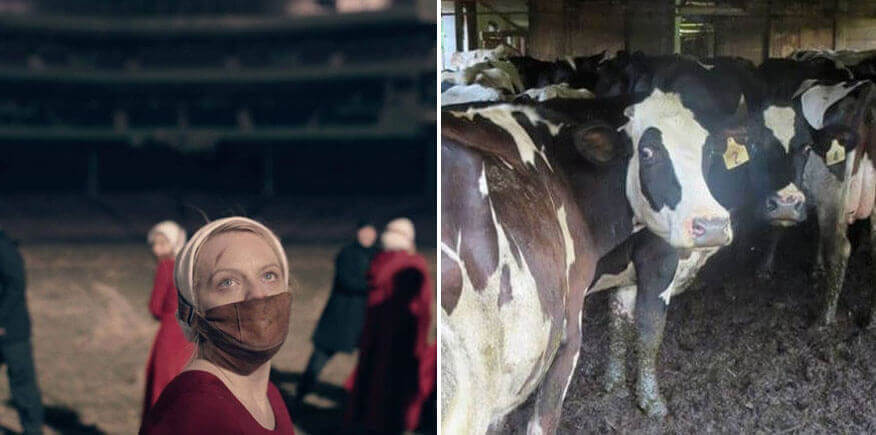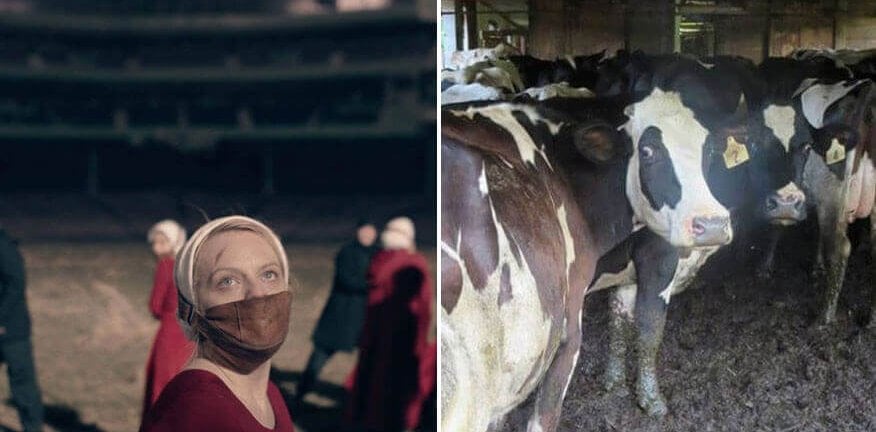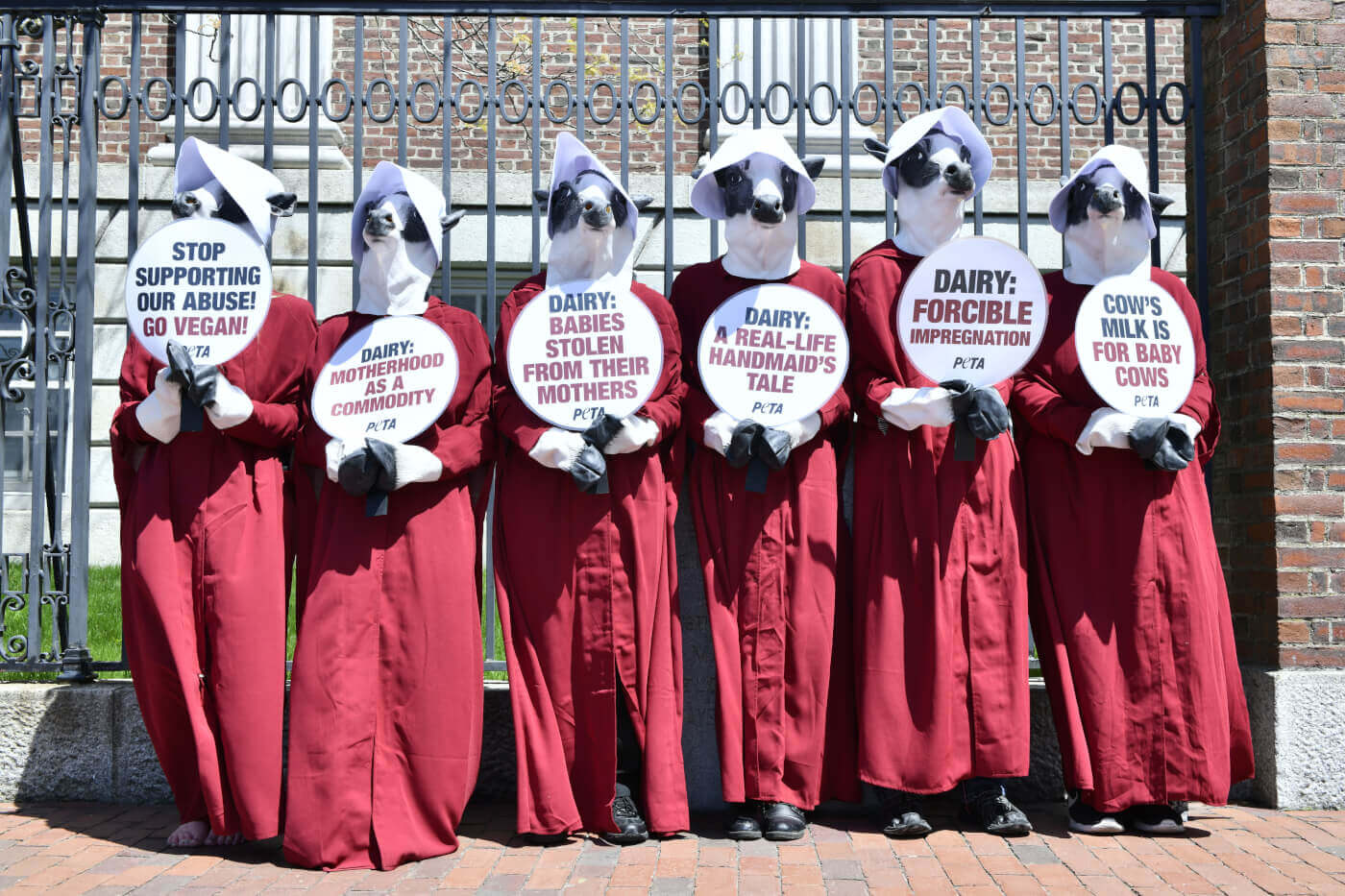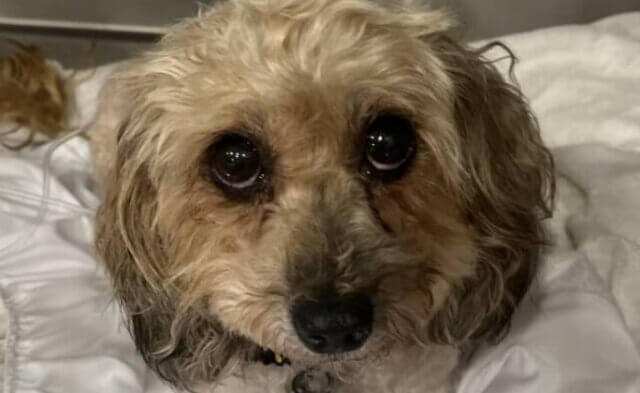“Please, please don’t take her!”
That anguished cry rends the air as soldiers kidnap the child of Offred, a “handmaid” in the hit Hulu series The Handmaid’s Tale. In this dystopian drama, fertile women have been reduced to breeding stock—raped by their “masters”—their bodies used for the benefit of others with no regard for their own needs or desires. The premise is that women of the future are treated like cows on today’s dairy farms, right down to the identification tags that are clamped onto their ears.
The show has received eight Emmy Awards for depicting women as farmed animals, and when PETA created a video suggesting that people imagine themselves in the place of such animals— who constantly face sexual assault and other abuse—many viewers “got it.” After watching the video , one person wrote, “As a rape survivor myself, this is one of the main points I make for why veganism is so great.”
In a haunting, real-life parallel to The Handmaid’s Tale, cows on dairy farms are artificially inseminated on what the industry itself has called a “rape rack.” Farmers shove an arm into each cow’s rectum to locate the uterus and then insert a tube into the vagina and inject bull semen. The cows are tightly restrained during this assault, their heads locked in a stanchion or chained facing forward. They’re powerless to resist, although they often bellow in distress.
The forced pregnancies can result in difficult births, as documented recently by PETA Asia on an Australian dairy farm. A painfully laboring cow named Tammy was subjected to a violent assault by farm workers involving an enormous metal clamp that held her immobile as a huge mechanical “calf puller” was used to drag the baby out of her womb. Both mother and baby died without receiving any veterinary care.
Calves on dairy farms are torn away from their mothers shortly after birth so that humans can steal the milk that the mothers produced for their babies. Like Offred, cows call out and resist when they’re separated from their beloved infants. PETA Asia documented that cows chased after trucks as they hauled away their newborn calves. On a dairy farm in Massachusetts, cows uttered such prolonged, agonizing cries when their calves were taken away that concerned neighbors called the police. In her book Do Unto Animals, Tracey Stewart describes hearing grieving cows “wail for four days straight” after being separated from their calves. “Sometimes you have to listen a little harder to understand what an animal is trying to say,” she writes. “And sometimes they are saying it so loudly it’s hard to imagine people don’t hear.”

LEFT: © instagram.com/handmaidsonhulu
What becomes of the calves? The females grow up to endure the same cycle of abuse as their mothers, and when they’re worn out and can no longer produce the maximum volume of milk—at about age 4—they’re sent off to slaughter. Male calves are either confined to a tiny crate or pen and raised for veal or sent to a feedlot to be fattened for beef. PETA Asia’s eyewitness filmed a worker on the Australian farm killing an unwanted calf by bludgeoning the baby with a hammer seven times. A worker callously commented, “Like, you can hit it again and again and again, bro.”
Margaret Atwood, the author of The Handmaid’s Tale, says that she’s often asked if it’s a feminist story. “If you mean a novel in which women are human beings—with all the variety of character and behavior that implies—and are also interesting and important, … then yes,” she wrote in an essay for The New York Times. “Why interesting and important? Because women are interesting and important in real life. They are not an afterthought of nature, they are not secondary players.”
The same can—and should—be said of animals. Female animals are mothers, sisters, and daughters, just as women are. A little bit of fur and some feathers can’t hide their beautiful brains and hearts that think, feel, ache, yearn, and experience joy, if we let them. Women are more than just pieces of meat, and so are animals.
We can make a conscious, powerful, ethical decision to protect the rights of females of other species every time we prepare a meal, by not consuming their body parts or bodily secretions. We can choose to exploit and enslave, or we can choose to empower and liberate. The better choice is obvious.






